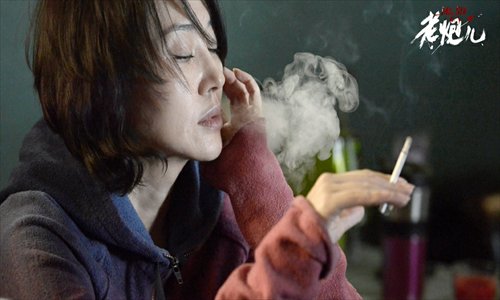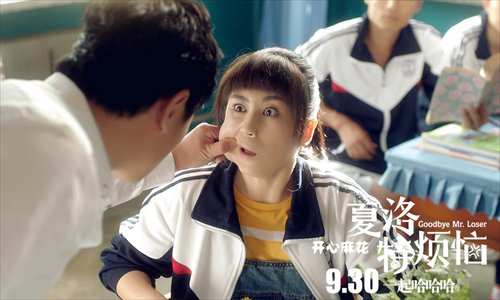HOME >> ARTS
When will Chinese films stop discriminating against women?
By Li Jingjing Source:Global Times Published: 2016-1-17 19:08:01

Stills from Mr. Six Photo: CFP
Besides recent staggering box office results, a darker side of the Chinese mainland movie industry has been triggering debates on the Chinese Internet as many female moviegoers have grown tired of the way values discriminating against women are portrayed in film."I'm not sure when it started, but the Chinese film market is currently dominated by values that make heroes out of a bunch of lewd middle-aged men. From elites to losers, this trend is everywhere," writer Huang Wen wrote in a recent article that went viral on social media.
It should come as no surprise that Huang's article is proving popular in China as many films' portrayals of female characters remind moviegoers that while the country has entered a new century, some deep-rooted sexist values are still very pervasive in society.
One major offender is the recently critically acclaimed film Mr. Six, directed by Guan Hu and starring renowned director Feng Xiaogang in the leading role.
The film depicts a retired gangster who must get involved in the world of organized crime once again to help his son. Although the world has changed, he still sticks to the principles he lived by back in his day.
The way the main character stands by what he believes in has earned the film a lot of praise. Its treatment of women, however, has disgusted many women in the audience.
The female character Huaxiazi is Feng's lover. A charming woman in her 40's she's attractive and sexy. She also has a great heart. When Feng's Mr. Six needs money to save his son, she lends him everything she has in her savings. When he suffers a heart attack and winds up in the hospital, she's the one who takes care of everything. However, the way she is treated is atrocious. When Mr. Six wants to have sex, he just pushes her down on her front and takes her (only to fail to perform).
The relationship comes across as strange, as viewers are left wondering why such an attractive and capable woman would want to be with such an average-looking, poor, arrogant and stubborn old man. Even more demeaning, when Mr. Six tells his son that he is the most important person in Six's life, his son asks Six about Huaxiazi, to which Six simply replies with disdain: "She's just a woman."
"This is the current situation for Chinese film. Women are always objectified, humiliated, oppressed and taking advantage of," says an article published in Iris Magazine, a Chinese film publication.
Although filmmakers themselves may not intentionally set out to treat women poorly in their films, it continues to happen time and time again in Chinese films.
"There are probably two reasons for this. First, that's the way audiences are and films are reflecting social reality. What audiences want to see is much stronger than a creator's personal opinions," the article explains.
"The second is that this has been the convention used to create relationships between the two sexes in films for years."

Stills from Goodbye Mr. Loser Photo: CFP
Wish fulfillment
Two other box office winners, Goodbye Mr. Loser and Lost in Hong Kong are also being criticized for the values they portray.
In Goodbye Mr. Loser, the main character Xia Luo is married to his high school sweetheart Ma Dongmei, who still loves him very much. With Xia unemployed, all the family's income comes from Ma, who rides a tricycle around selling junk.
Yet Xia treats Ma like she's nothing. Instead he is super obsessed with his first love, the prettiest girl in his school who he never got a chance to be with.
Attending his obsession's wedding, Xia has a wild dream in which he travels back in time to high school. During his time there he becomes a successful singer by ripping off famous songs from current singers and marries his first love.
Lost in Hong Kong features a similarly obsessed middle-aged man who decides to go to Hong Kong in search of his first love behind the back of the pretty wife who supported him over the years.
"In most storylines, there is always a selfish ugly man who has a hormone-filled absurd fantasy about his life, some cheap pathos and a woman who never abandons him and just waits for him to return," Huang wrote, explaining that while some so-called pioneering directors may look like they are promoting modern culture, but under it all, they are still presenting ingrained traditional values about the role a woman should play in a relationship.
Time to get tough
Treatment of women in film is still a problem for Hollywood as well, as many films still randomly throw in a female character just to make the male character look better. Take the 007 series as an example, in the latest installment Spectre, many fans were excited to hear Monica Bellucci had joined the cast and couldn't wait to see her performance. But after watching the film, even many male fans said they didn't understand why Bellucci was willing to play such a character as her only function was to "have sex with Bond and then die."
However, things in Hollywood have improved as more films feature female characters as the hero.
The global financial success of The Hunger Games franchise has successfully established the image of a female savior who is strong, independent and unyielding.
These changes can be traced back to 1979, when the film Alien by Ridley Scott hit theaters. To this day, Sigourney Weaver's tough woman image still remains an unforgettable part of film history.
However, it still remains to be seen when Chinese films will begin to reverse current trends.
Newspaper headline: Divorced from reality
Posted in: Film